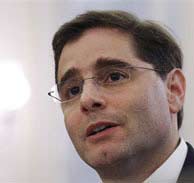The head of the U.S. Federal Communications Commission wants to strengthen the push for equal access on the Internet. Some companies oppose what they see as government interference.
This is the VOA Special English Economics Report.
"Information wants to be free," the saying goes. But the debate over net neutrality could define how free the exchange of information is going to be in the future.
Net neutrality is the idea that everything on the Internet should be treated equally. That sounds simple. But the issue is a complex mix of technical, business, political and legal questions.

In the United States, communication law is enforced by the Federal Communications Commission. Since 2005, the F.C.C. has used four policy principles to guide its enforcement in cases related to the Internet.
The policy statement says consumers must be able to get the lawful content, applications and services of their choice. Users must be able to connect their choice of devices that are legal and do not harm the network. Another principle supports competition.
This week, in a speech, F.C.C. Chairman Julius Genachowski proposed two more. One would say Internet providers could not discriminate against content or applications. The other would require they explain how they manage their networks.
The F.C.C. chairman also wants to extend all six principles to wireless carriers now that their phones access the Internet. And he wants to make the principles into rules. Next month he will seek to begin the process, which starts with collecting public comment.
The new proposals have roots in disputes involving two companies. In 2007, Verizon refused to make it easier for an abortion rights group to send text messages to its supporters. Verizon said it did not accept programs on issues like abortion or war, but it quickly changed its decision.
And last year, a divided F.C.C. ruled against Comcast for interfering with traffic to a lawful music and video sharing site. At first, Comcast denied it, but then defended its actions as "reasonable network management." Critics said Comcast was trying to block competition with its cable video programming.
Chairman Genachowski says a "free and open Internet" must be safeguarded. But providers say they sometimes have to block sites to prevent abuse. And a big wireless carrier, AT&T, calls extending the net neutrality policy "a risky experiment" with American investment in high-speed Internet.
There is also debate about the desire of some Internet providers to offer special treatment to sites willing to pay for it. That goes against the custom of treating all sites neutrally.
And that's the VOA Special English Economics Report, written by Mario Ritter.
Related stories:
調(diào)查:美國年輕人互聯(lián)網(wǎng)使用率不及他國
The many sounds of college radio
手機私語“擾民” 美國影院欲設(shè)干擾
南非:飛鴿傳信比網(wǎng)絡(luò)快!
(Source: VOA 英語點津編輯)